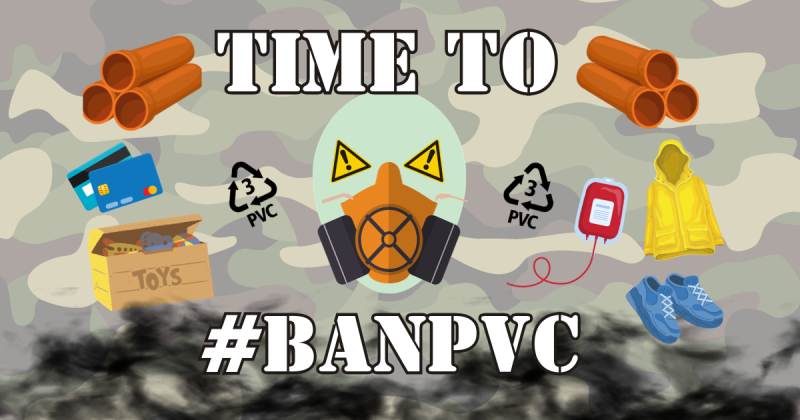Stay always informed
Interested in our articles? Get the latest information and analysis straight to your email. Sign up for our newsletter.
Image from Rawpixel: https://www.rawpixel.com/image/5924958
As negotiators gather to discuss the Global Plastics Treaty, fossil fuel and plastics lobbyists oppose any deal that limits plastics production. But such limits are the only way to protect the health of humans, ecosystems, and the climate. We need a lobby firewall between policy-makers and industry.
** Keep reading to take action to ban PVC! **
Next week delegates will meet in Nairobi, Kenya to continue negotiations on the UN's Global Plastics Treaty (GPT). The first draft of the Treaty talks about the need to “end plastic pollution, including in the marine environment, and to protect human health and the environment”. Campaigners in the #BreakFreeFromPlastics coalition say that the Treaty should emphasise prevention as “the only possible path” to ensure that human health and the environment are preserved from the harm of unregulated and unlimited plastic production.
These issues are urgent and a high level of ambition is required. A 2022 scientific study found that pollution caused by plastics and other chemicals has already “exceeded safe planetary boundaries” threatening the stability of the earth’s systems. The total mass of plastics on the planet is now over twice that of all living mammals, and roughly 80 per cent of all plastics ever produced remain in the environment. Yet despite this, the production of virgin plastics – 97-99 per cent of which are made from oil and gas, accounting for 6 per cent of global oil and gas consumption – continues to spiral out of control. The human health implications of plastics pollution range from harmful effects on respiratory, nervous, and gastrointestinal systems, to higher risks of cancer, the impairment of the immune system, and much else.
If the GPT properly delivers, it will rightly threaten the products and business models of the fossil fuel and plastics industries – and they have been mobilising accordingly. Last year Reuters mapped how industry had been “devising strategies to persuade [GPT] conference participants to reject any deal that would limit plastic manufacturing”. In particular it exposed the role of the American Chemistry Council (ACC) in trying to organise industry against the GPT and lobby US decision-makers. The EU trade association PlasticsEurope, one of the biggest lobby groups in Brussels, has also been busy. It says it supports the GPT, but also argues for “sustainable plastic production” (greenwash for business as usual?) and argues that “a one-size fits all global approach to policy and regulation cannot work”.
Overall the plastics industry wants to emphasise more recycling rather than less plastic production as the latter would hit its financial bottom line. This delay tactic to avoid tackling the serious problem of plastic pollution conveniently ignores that very low rates of plastic actually end up being recycled, alongside health and environmental concerns about the recycling process.
We know from the experience of battling tobacco and fossil fuel companies to reduce smoking and greenhouse gas emissions that industry will do all in its power to delay, weaken, or scupper new rules to control their toxic products. Learning from this, and to prevent fossil fuel and petrochemical industry influence on the GPT, a group of scientists and NGOs, coordinated by Greenpeace International, wrote to the leaders of the Treaty negotiations to ask that they protect talks from malign industry influence. Their demands include:
To recognise that the public interest in addressing plastic pollution is not compatible with the private interests of the fossil fuel and petrochemical companies that produce plastic.
To support the adoption of a strong conflict of interest policy to ensure that fossil fuel and petrochemical companies are not allowed to undermine the global response to plastic pollution.
To protect official spaces at and around the treaty talks from fossil fuel and petrochemical industry influence, including sponsorship and participation.
To deliver on “Polluters out, People and Independent Science in”, including to prioritise giving seats at the table to Indigenous Peoples and impacted communities who live on the frontline of plastic pollution.
The demands take inspiration from the World Health Organisation’s rules to protect public interest decision-making on tobacco control from industry influence. More recently campaigners from the Kick Big Polluters Out coalition secured an agreement at the UN’s climate negotiations that all participants must disclose their affiliation, including to fossil fuel companies, prior to participation. The next step must be an Accountability Framework to fully protect climate action from the vested interests of polluters.
It’s vital that the GPT organisers move swiftly to create a lobby firewall to prevent the fossil fuel and toxics industries from sabotaging efforts to stop plastic pollution. An ambitious timetable has been set to conclude GPT talks by the close of 2024. Whether or not there is a successful outcome could well depend on the extent of industry access to the negotiations.
Read more about the lobby power of the chemicals and plastics industries.
EU campaigners are demanding policy-makers ban PVC, a harmful, everyday plastic that exposes people to toxic chemicals and endangers our environment. PVC is all around us in pipes, packaging, building materials, medical products, clothing, etc. Its production has serious consequences: workers are exposed to carcinogenic chemicals, it contributes to climate change through the high amounts of energy needed during production, it generates carbon and methane emissions, and damages the ozone layer. Most PVC ends up in landfill or is incinerated where it emits more toxic chemicals such as dioxins. This is why it is urgent to ban PVC to protect our health and the environment. An EU ban will help build pressure for a global phase-out of PVC via the Global Plastics Treaty. Take action today.
